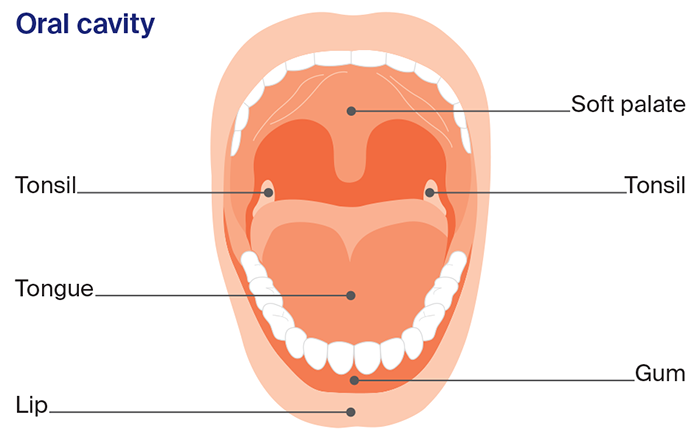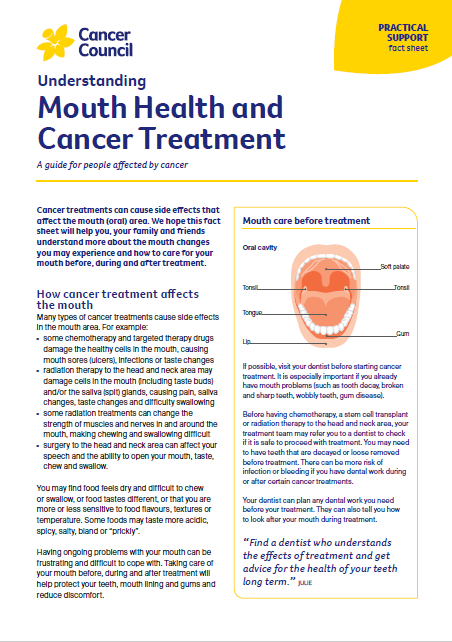- Home
- About Cancer
- Managing side effects
- Mouth health and cancer treatment
- How cancer treatment affects the mouth
How cancer treatment affects the mouth
Some cancer treatments cause side effects in the mouth (oral) area. This information will help you, your family and friends understand more about the mouth changes you may experience and how to care for your mouth before, during and after treatment.
Learn more about:
How treatment affects the mouth
Many types of cancer treatments cause side effects in the mouth area. For example:
- some chemotherapy and targeted therapy drugs damage the healthy cells in the mouth, causing mouth sores (ulcers), infections or taste changes
- radiation therapy to the head and neck area may damage cells in the mouth (including taste buds) and/or the saliva (spit) glands, causing pain, saliva changes, taste changes and difficulty swallowing
- some radiation treatments can change the strength of muscles and nerves in and around the mouth, making chewing and swallowing difficult
- surgery to the head and neck area can affect your speech and the ability to open your mouth, taste, chew and swallow.
You may find food feels dry and difficult to chew or swallow, or food tastes different, or that you are more or less sensitive to food flavours, textures or temperature. Some foods may taste more acidic, spicy, salty, bland or “prickly”.
Having ongoing problems with your mouth can be frustrating and difficult to cope with. Taking care of your mouth before, during and after treatment will help protect your teeth, mouth lining and gums and reduce discomfort.
Mouth care before treatment

If possible, visit your dentist before starting cancer treatment. It is especially important if you already have mouth problems (such as tooth decay, broken and sharp teeth, wobbly teeth, gum disease).
Before having chemotherapy, a stem cell transplant or radiation therapy to the head and neck area, your treatment team may refer you to a dentist to check if it is safe to proceed with treatment.
You may need to have teeth that are decayed or loose removed before treatment.
There can be more risk of infection or bleeding if you have dental work during or after certain cancer treatments.
Your dentist can plan any dental work you need before your treatment. They can also tell you how to look after your mouth during treatment.
→ READ MORE: Oral side effects caused by cancer treatments
Find a dentist who understands the effects of treatment and get advice for the health of your teeth long term.
— Julie
Podcast for people affected by cancer
Listen now
More resources
Dr Sophie Beaumont, Head of Dental Oncology, Peter MacCallum Cancer Centre, VIC; Dr Teresa Brown, Assistant Director Dietetics, Royal Brisbane & Women’s Hospital, QLD; Ken Colbert, Consumer; Sarah Davies, Head and Neck Nurse Practitioner, Chris O’Brien Lifehouse, NSW; Dr Adrian DeAngelis, Oral and Maxillofacial Surgeon, Royal Melbourne Hospital and OMFS, VIC; Tess Dunlop, Speech Pathologist, Peter MacCallum Cancer Centre, VIC; Elizabeth Egan, Clinical Nurse Consultant – Oncology, St John of God Subiaco Hospital, WA; Alan Harding, Consumer; Dr Michelle Kang, Oral Medicine Specialist, Sydney Oral Medicine, Sydney and Hunter New England Local Health Districts, NSW; Julie McGirr, 13 11 20 Consultant, Cancer Council Victoria; Amy O’Halloran on behalf of Chris O’Brien Lifehouse Dietetics Team, NSW; Megan Sanders, Clinical Dietitian, Head and Neck Services, Peter MacCallum Cancer Centre, VIC.
View the Cancer Council NSW editorial policy.
View all publications or call 13 11 20 for free printed copies.

